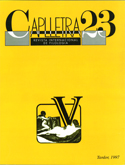«Tirant lo Blanch» i la historiografia catalana medieval
DOI:
https://doi.org/10.7203/caplletra.23.7291Keywords:
Tirant lo Blanch, historiografia, cròniques, textos paral·lels Abstract
Abstract
The importance of historiography in the creation of the novel is an irrefutable fact in literature, especially in Greek inerature. Did the same happen in Catalan literature? Paül Limorti follows the traces of the historiographic genre in the making of the narrative technique of Tirant lo Blanch. Front this point of view the author analyses the creation of Diafebus as a character-narrator, which is a typical device used in the chronicies to achieve a stronger historic realism. In this sense, the author studies the manner of interrelation typical of chronicles and of Tirant lo Blanch. Another device used by Martorell to present this work as a historic recreation is the group of parallel texts (prologue and dedication) which heads the book, as well as the topics which can be found in it: the false translation and the reuse of previous texts.
 Downloads
Downloads
Downloads
Published
How to Cite
-
Abstract367
-
PDF (Català)180
Issue
Section
License
Authors submitting work to Caplletra for publication must be the legitimate holder of the usage rights. Legitimacy for the purposes of publishing the work must also include images, tables, diagrams and any other materials that may complement the text, whether they are the author of such material or not.
Copyright: on publishing their work in the journal, the author grants Caplletra. Revista Internacional de Filologia usage rights (reproduction, distribution and public communication) for both the paper printed version and for the electronic version.
All work published in Caplletra is covered by the Creative Commons license type Attribution-NonCommercial-NoDerivatives 4.0 (CC BY-NC-ND 4.0).
RESPONSABILITY
Caplletra. Revista Internacional de Filologia does not necessarily identify with the points of view expressed in the papers it publishes.
Caplletra. Revista Internacional de Filologia accepts no responsibility whatsoever for any eventual infringement of intellectual property rights on the part of authors.






